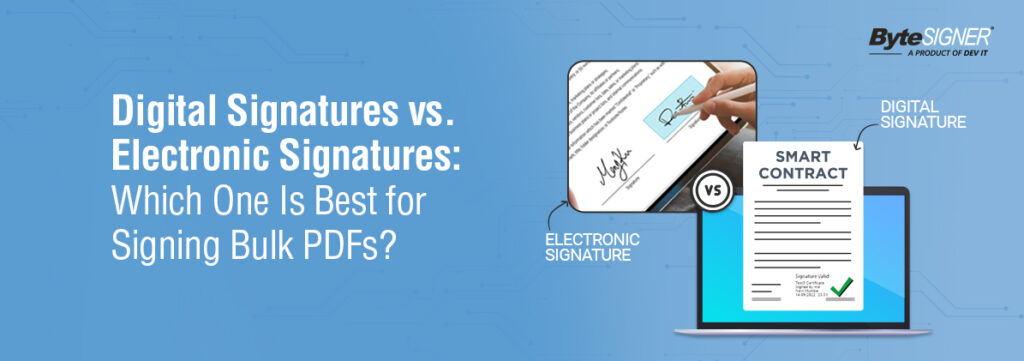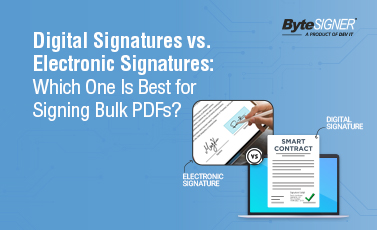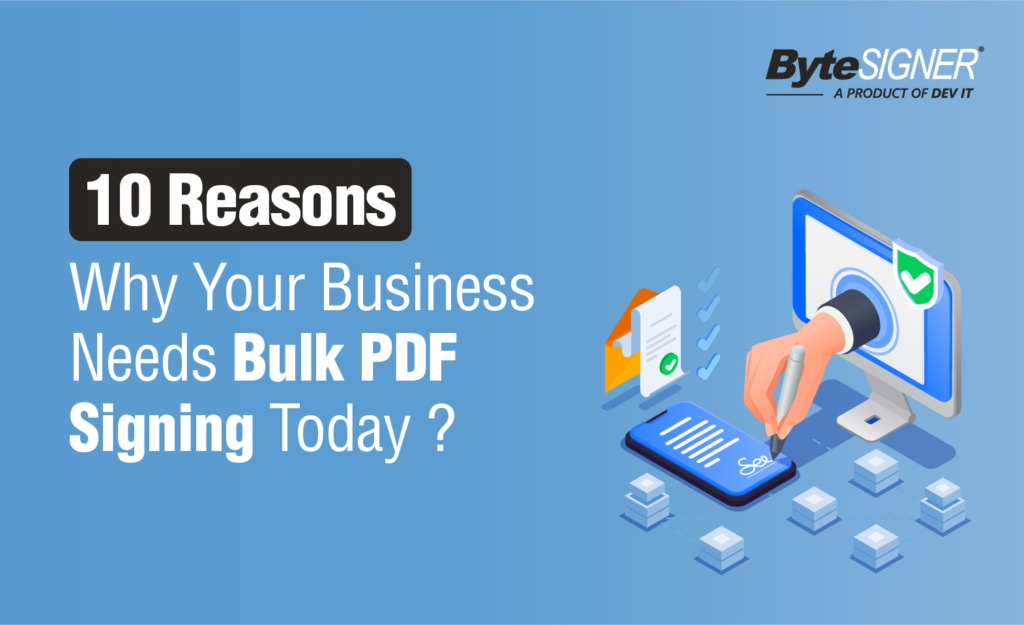
If you run a business today, you already know how much it depends on PDFs. Contracts, invoices, employee agreements, compliance reports, financial statements, almost everything lives in PDF format. And let’s be honest, it’s rarely just one or two documents. More often, it’s hundreds, sometimes even thousands, that need to be reviewed and signed without delay.
That’s where digital signatures and electronic signatures come into play. Many people treat them as the same thing, but they’re actually quite different. And when your business depends on bulk PDF signing, choosing the right method can make a huge difference in security, compliance, and efficiency.
So, let’s answer the big questions:
What’s the difference between a digital signature and an electronic signature?
Which one is more secure?
And most importantly, which should you use when signing bulk PDFs?
Let’s break it down.
What Is a Digital Signature?
A digital signature isn’t just a digital version of your handwritten name. It’s a secure, certificate-based technology built on Public Key Infrastructure (PKI). Think of it as a digital lock that guarantees your PDF hasn’t been tampered with after signing.
Here’s the simple breakdown:
- When you sign with a digital signature, a private key locks the file.
- Anyone opening it can use the matching public key to confirm authenticity.
- If even one character inside the file changes after signing, the signature immediately shows as invalid.
Why businesses rely on digital signatures:
- Legally valid in most countries.
- Encrypted and tamper-proof.
- Confirms the true identity of the signer.
- Provides a traceable audit trail.
That’s why industries like banking, healthcare, law, IT, and government don’t just prefer digital signatures—they often require them.
What About Electronic Signatures?
Electronic signatures (e-signatures) are much broader and simpler. They could mean:
- Typing your name at the end of a document.
- Clicking “I agree” on a digital form.
- Uploading a scanned image of your handwritten signature.
They work fine for low-risk tasks—HR approvals, NDAs, internal memos, or small agreements. But when security and compliance are critical, e-signatures often fall short.
Limitations of e-signatures:
- Easier to forge or manipulate.
- Not always legally accepted in regulated industries.
- Weak or non-existent audit trails.
In short, they’re quick and convenient but lack the depth of protection digital signatures provide.
Bulk PDF Signing: The Real Challenge for Businesses
Picture this: you’re a finance manager who must sign 500 invoices before the weekends. Or you’re in HR with 1,000 employee agreements waiting for your approval.
Signing one or two PDFs is no big deal. But hundreds of them? That’s more than a hassle—it’s a serious productivity roadblock.
Here’s why bulk signing matters:
- Speed – Sign hundreds of PDFs in minutes, not days.
- Consistency – Eliminate errors by ensuring every file is signed properly.
- Compliance – Each document carries a valid, traceable signature.
- Scalability – As your business grows, you don’t drown in paperwork.
This is exactly why digital signatures outperform e-signatures when it comes to bulk signing.
Why Digital Signatures Win for Bulk PDF Signing
If it’s just a quick approval or casual document, an e-signature may work. But for bulk signing—especially sensitive, high-volume, or compliance-heavy documents—digital signatures are the clear winner.
Here’s why:
- Security First – Each PDF is encrypted, making tampering nearly impossible.
- Automation Ready – With the right solution (like ByteSigner), you can sign multiple PDFs at once.
- Audit Trail – Every signed document carries verifiable proof.
- Globally Accepted – Meets strict international standards such as eIDAS (EU), IT Act (India), and ESIGN (US).
How ByteSigner Makes Bulk PDF Signing Easy
Here’s the catch with many signing tools: they either require internet access or don’t support bulk signing. That’s a big issue for companies working with sensitive data or in offline, secure environments.
This is where ByteSigner steps in.
Key benefits of ByteSigner’s bulk signing:
- Bulk Signing – Select multiple PDFs and sign them instantly.
- Works Offline – No internet? No problem. You can still sign securely.
- Enterprise-Grade Security – Encrypted, tamper-proof protection.
- Huge Time Saver – What used to take hours now takes minutes.
- Legally Valid – Fully compliant with global regulations.
Whether you’re a startup managing contracts, a large enterprise handling compliance files, or a finance team processing invoices, ByteSigner makes bulk PDF signing smarter, faster, and more secure.
Digital Signatures vs. Electronic Signatures: Quick Comparison
| Feature | Digital Signature  | Electronic Signature  |
| Security | Encrypted & tamper-proof | Basic, easier to forge |
| Legality | Accepted worldwide | Limited by region/industry |
| Compliance | Meets strict regulations | Restricted acceptance |
| Best For | Bulk, sensitive, legal docs | Quick, low-risk files |
| Audit Trail | Detailed & verifiable | Often minimal |
| Bulk Siging | Supports large batches of PDFs | Not designed for bulk signing |
| Offline Signing | Possible with tools like ByteSigner | Usually online only |
Conclusion
Both digital and electronic signatures have their place. If you’re approving a simple agreement or handling low-risk paperwork, an electronic signature does the job well. But when it comes to signing large volumes of sensitive documents where compliance, trust, and security matter, digital signatures are the safer choice.
With a solution like ByteSigner, you can go a step further—signing hundreds of PDFs in bulk, securely, and even without an internet connection.
When security and efficiency are non-negotiable, the answer is clear: digital signatures with ByteSigner.
Want to explore how ByteSigner can make bulk digital signing easier and more secure for your business? Get in touch with us today, we’d be glad to help.



